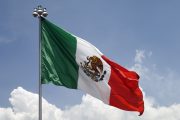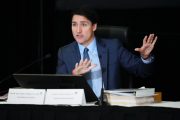
Amid the imposition of tariffs and a high-profile spat with far-left Canadian Prime Minister Justin Trudeau, White House officials have been publicly pledging that negotiations on the North American Free Trade Agreement (NAFTA) are ongoing — sort of. Globalist advocates of the sovereignty-shredding “free trade” scheme, though, are starting to get nervous about the future of their agenda to undermine national independence and self-government across the continent via “trade.” And there may be a good reason for their concerns, as Trump tries to move toward bilateral talks. Establishment-minded Republican senators, meanwhile, are demanding that Trump deliver a deal by Labor Day. But as of now, the prospect of that happening appears slim.
The establishment press is reporting that the Trump administration’s decision to impose tariffs on aluminum and steel from Mexico and Canada has deadlocked NAFTA talks between the three governments. And so, the White House is now trying to pursue separate, bilateral negotiations with Canadian and Mexican authorities. Multiple analysts have interpreted the move as an effort to create bilateral agreements with each government and scrap the multilateral “trade” regime created under NAFTA. “It could be that NAFTA will be a different form,” Trump said after the G7 meeting. “It could be with Canada, with Mexico, one on one — much simpler agreement, much easier to do. I think better for both countries. We’re talking about that among other things.”
If that ends up happening, the strategy would be perfectly in line with Trump’s campaign pledges, his publicly expressed hostility toward globalism and multilateralism, and his statements supporting bilateral trade agreements over deals that undermine U.S. sovereignty. It would also likely find strong support among his base. And with the polls showing that voters believe NAFTA benefits Mexico and Canada more than the United States, a bilateral approach to getting a “better deal” on trade with the two nations would likely hold widespread popular appeal. But if Trump does not see the deal he wants, he may scrap NAFTA altogether, he warned. “If we’re unable to make a deal we’ll terminate NAFTA,” Trump warned again late last week. “With that being said I think we’ll probably easily make a deal.”
Top administration officials have emphasized the new dynamics in public statements. Speaking during an interview on Fox News, White House Economic Adviser Larry Kudlow reiterated the move to a bilateral approach. “His preference now, he asked me to convey this, is to actually negotiate with Mexico and Canada separately,” Kudlow said last week. “I know this is just three countries but still, you know, oftentimes when you have to compromise with a whole bunch of countries you get the worst of the deals.” Still, Kudlow suggested that Trump was not planning to fully withdraw from NAFTA, an idea the president has floated on multiple occasions to deal with what he blasted as the “worst deal maybe ever signed anywhere.” In a later interview on CBS, Kudlow suggested a new deal may not be possible, thanks in part to what he described as Trudeau’s “betrayal” after the G-7 meeting.
Despite the hysteria expressed by globalists seeking to further empower sovereignty-stealing North American institutions, killing NAFTA and moving toward bilateral trade negotiations would hardly stop trade between the nations of the continent. In fact, Americans traded with people and companies in neighboring countries for hundreds of years before NAFTA and other multilateral “free trade” schemes were even a dream in the mind of a globalist insider. But globalists are fighting hard to salvage and even expand NAFTA. As The New American reported early on, U.S. Trade Representative Robert Lighthizer, a member of the globalist-minded Council on Foreign Relations, sent Congress a letter outlining his plan to erode national sovereignty in even more areas than the existing “trade” regime.
Among other changes, Lighthizer suggested that the updated NAFTA would encompass a broad range of subjects and economic sectors that were previously not covered. Those include intellectual property rights, government regulatory practices, state-owned enterprises, services, customs procedures, sanity measures, labor, environment, small businesses, and more. “In particular, we note that NAFTA was negotiated 25 years ago, and while our economy and businesses have changed considerably during that period, NAFTA has not,” wrote Lighthizer in the letter. “Moreover, establishing effective implementation and aggressive enforcement of the commitments … under our trade agreements is vital to the success of those agreements and should be improved in the context of NAFTA.” In short, globalists want more “teeth” in NAFTA.
But now, that may all be a moot point. And with elections in Mexico and the United States coming up soon that could totally change the dynamics, lawmakers and globalists are very concerned. In a White House meeting last week, senior GOP members of Congress told Trump that they want a new NAFTA deal done quickly. “There’s a real feeling among the senators that was sent to the president that we need some sort of agreement, at least on NAFTA, by Labor Day,” Senator Chuck Grassley (R-Iowa), who was at the meeting, was quoted as saying by The Hill. Senator Joni Ernst (R-Iowa), who campaigned as a grassroots conservative but is nevertheless supporting globalist “trade” deals, also said she would “love to see progress” on the North American scheme. Some globalist GOP senators such as CFR member Bob Corker of Tennessee are even pushing to remove Trump’s authorities and leverage. At least one key Republican lawmaker, Senate Majority Whip John Cornyn (R-Texas), said any action on NAFTA would now likely have to wait until 2019.
In tandem with NAFTA demands, establishment Republicans who support surrendering U.S. sovereignty under the guise of “trade” are also scheming to provide amnesty for illegal immigrants — the overwhelming majority of whom will vote for Democrats. High-profile conservatives are speaking out. “We elected them to build a wall, to secure the southern border, to enforce the immigration laws already on the books, and to put the American people first,” explained Jenny Beth Martin, who leads the Tea Party Patriots. “Their inaction is prompting more and more people to enter our country illegally with the hope that they too will be granted amnesty and be allowed to stay.” Of course, NAFTA and massive immigration are both part of the same globalist agenda, though the establishment press treats the issues as unrelated.
Globalist commentators, too, were fuming about Trump’s perceived lack of submission to the establishment’s “free trade” demands. Automotive News editor Krishnan Anantharaman, who publicly describes himself as “Enemy of the American people,” is among those whining about the potential implosion of NAFTA. Among his concerns is that the “spirit of cooperation” among governments in North America is “in tatters.” “So this is not just a missed opportunity. It’s a big step backward, and into the unknown,” wrote Anantharaman. “The outlandish and downright punitive demands of the Trump administration’s NAFTA negotiating team have us diving into the mouth of a global trade crisis.” Bigwigs at the Federal Reserve System, who claim they need to be insulated from “politics” and therefore should not be properly audited, also chimed in to attack Trump’s efforts.
South of the border, Mexican officials have called for more “flexibility” if there is any hope of reaching a deal. Favored Mexican presidential candidate Andres Manuel Lopez Obrador of the ultra-leftist National Regeneration Movement (MORENA), who may take power very soon, argued that his nation would survive just fine without NAFTA. “I am going to suggest that the treaty remains, but [the end of NAFTA] cannot be fatal for Mexicans, our country has a lot of natural resources, a lot of wealth,” he said. However, his top economic adviser, Gerardo Esquivel, suggested that the radical leftist wanted the same basic thing that globalists in America want: a deeper NAFTA that usurps even more sovereignty.“We want to have a NAFTA 2.0 not a NAFTA 0.5,” Esquivel said. “That means we want a better and updated NAFTA.”
Trump administration Director of Legislative Affairs Marc Short offered more insight while speaking to the tax-funded leftwing mouthpiece PBS. In particular, he emphasized that Trump was upset with the Canadian government’s refusal to lower trade barriers that hinder or even prevent many U.S. exports from flowing to Canada. Dairy is one of the many products that Canadian authorities imposes huge tariffs on. The hostile PBS interviewer continued to harangue Short by quoting negative views about Trump on NAFTA from globalist Senator John McCain (R-Ariz.) and from the Wall Street Journal. But Short hit back. “I think the president has continued to advocate for things the American people believe in and that is why he was elected president,” he explained. “He campaigned on a promise that he was going to deliver for the workers of America. That is why he won so many of the Midwestern states. And that is exactly what he is delivering on.”
Finally, Short urged the skeptics of Trump’s trade policies to be patient, saying “the economy going in the right direction” and that the president was responsible for making that happen. “The president, I think, deserves our ability to say, you have delivered for us on the economy,” Short concluded. “You deserve the leverage to negotiate better deals, because he feels like for 70 years, to the point John McCain that is making, for 70 years, in many cases, we provide a lot of things to our partners overseas, as far as their national security, and they have taken advantage of us on trade.” Of course, that is very true — U.S. industry and economic wellbeing has been decimated by foreign powers and the multilateral institutions that U.S. taxpayers have been financially supporting for decades. Whether Trump can fix that remains to be seen.
Many of Trump’s strongest supporters are still hoping that he will kill NAFTA entirely. Some suspect that may eventually happen, after Trump makes it look like every effort to secure a fair deal has been attempted without success. But for now, at least, his top officials say he is still working to get a new deal in place. And that means Americans who value self-government, the Constitution, and national sovereignty must continue working to expose the dangers of NAFTA and other multilateral “trade” regimes.
The real danger is not so much that they are bad for the U.S. economy and American workers, even though they are and have been. Instead, the biggest threat is that these pseudo-“free trade” monstrosities, which include thousands of pages of regulations, usurp the American people’s authority to govern themselves. In short, NAFTA and similar schemes replace self-government with rule by transnational bureaucracies and courts. In Europe, the end game is already becoming clear in the totalitarian-minded super-state known as the European Union. By far the best course of action would be to get out of NAFTA — not renegotiate. Patriotic Americans should ensure that their elected officials know why.
Photo: theasis/iStock/Getty Images Plus
Alex Newman is a correspondent for The New American, covering economics, education, politics, and more. He can be reached at [email protected]. Follow him on Twitter @ALEXNEWMAN_JOU or on Facebook.
Related articles:
With New NAFTA Looming, Activists Plan to Fight For Sovereignty
Don’t Renegotiate NAFTA: Get US Out
On NAFTA, Trump’s True Intentions Remain Unclear
“After America Comes North America,” Gen. Petraeus Boasts
Some of Trump’s Picks Have Troubling Links to Globalism, CFR
Trump Has Huge Opportunity To Kill NAFTA
The “Free Trade” Agenda Threatens Our Rights
WikiLeaks Confirms North American Integration Scheme
North American Union: From NAFTA to the NAU
North American Integration Continues After Robert Pastor
Council On Foreign Relations Exposed
U.S. Government and Top Mexican Drug Cartel Exposed as Partners
The EU: Regionalization Trumps Sovereignty
North American Union Moves Closer After Trilateral Summit
Trump Attacks Clinton’s Support for NAFTA and Other Trade Agreements




